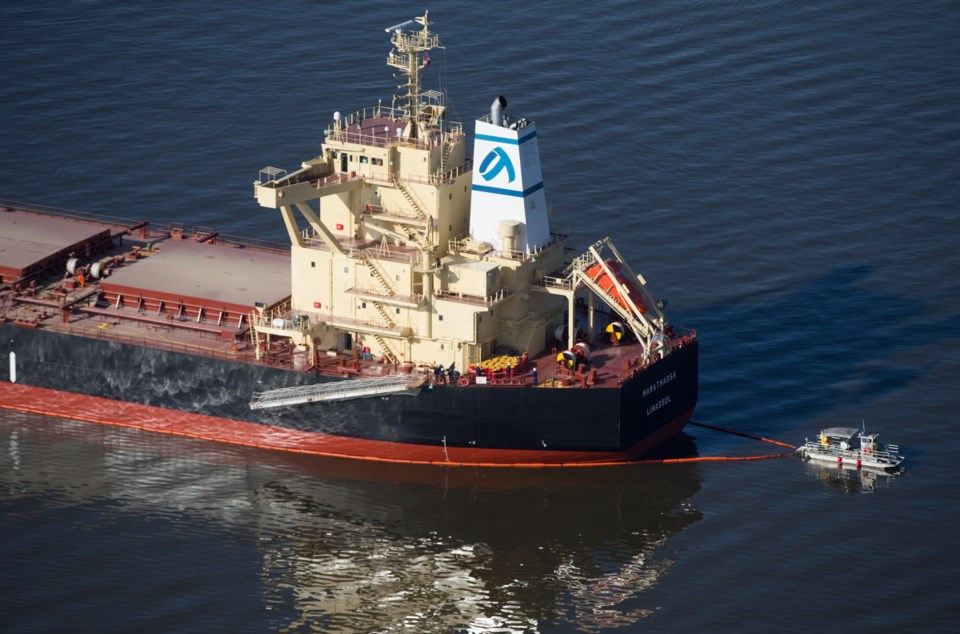The company hired to clean up the oil spill in Vancouver’s English Bay has vessels stationed around Vancouver Island — including the largest ship at CFB Esquimalt — that would be ready to respond if a spill happened in our waters.
One of the six vessels involved in last week’s cleanup, after grain carrier MV Marathassa spilled about 2,700 litres of bunker fuel, was sent from Cowichan Bay.
Western Canada Marine Response Corp. operates a fleet of 31 vessels across the province, including about 10 around Vancouver Island.
The largest oil skimmer in Canada, the Burrard cleaner No. 9, is located at Canadian Forces Base Esquimalt.
The company is responsible for responding to cleanups after an oil spill has been detected by either the ship responsible or the Canadian Coast Guard, said Michael Lowry, a spokesman for the corporation.
In the English Bay case, the company was notified at 6:08 p.m. April 8 to be on standby after a recreational boater notified the coast guard about a spill an hour earlier. The company was officially dispatched at 8:06 p.m. and several vessels arrived on scene at 9:25 p.m.
One vessel has an infrared camera designed to track oil, which was used to determine that the oil was coming from Marathassa. The vessel was surrounded by a boom by 5:25 a.m., Lowry said.
“I just want to dispel the notion that the length of time for the vessel to be boomed was a response-time issue,” Lowry said.
“It was a need to identify the source of the spill. That entire time, that oil was being cleaned up.”
Lowry said the 2013 closure of the Kitsilano coast guard station had no impact on the company’s ability to respond.
Fred Moxy, the former commander of that coast guard station, said over the weekend the response time would have been minutes instead of hours if the station was still open.
The Marine Response company, which has offices in Burnaby, Duncan and Prince Rupert, is called to clean up spills about 20 times a year, mostly minor spills around the Burrard Inlet. It collects membership fees from oil companies, float plane companies, the commercial shipping industry, ferries, cruise ships and fishing lodges.
Next week in Nanaimo, company employees as well as provincial and federal agencies involved in spill cleanup will participate in a certification exercise, which will involve a simulated spill.
Western Canada Marine Response Corp. has 50 full-time employees and an additional 150 contractors trained and ready to respond to a spill.
“It’s not feasible having 200 people waiting around for a spill,” Lowry said.
“The contractors we train in that location can operate the skimming and the boom until we get there.”
Canadian Coast Guard commissioner Jody Thomas said 80 per cent of the spill had been cleaned up within 24 hours of the spill being reported. Lowry said some employees remain on site cleaning the hulls of other vessels and monitoring the beaches.
The company will bill the ship’s owner for the cost of the cleanup, but Lowry said it’s too early to determine what that is.
Investigators said Monday the spill was a result of mechanical problems that caused oil to leak into the ship’s duct keel, a tunnel carrying pipes that run along the centre line of the vessel.
There was also an unrelated problem on Marathassa that contributed to the spill, but Transport Canada declined to provide details because of the ongoing investigation.



